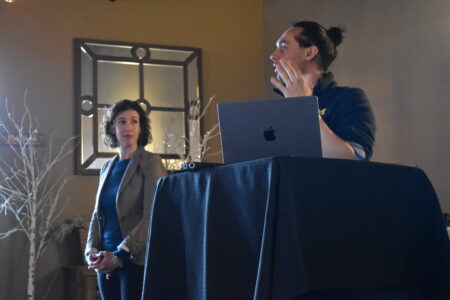Money talks
HOUGHTON – Whether one agrees with the concept or not, money has a powerful influence in American politics, and Thursday the League of Women Voters of the Copper Country gave an overview of the issue.
At the Portage Lake District Library, Mary Jane Hatton, acting president of the LWVCC, gave a PowerPoint presentation of money in politics going back to the 19th century.
Hatton said there have been many congressional efforts to control the influence of money in politics beginning in 1907 when the Tillman Act banned political contributions from banks and corporations in response to what was seen as corruption of the political system.
“We had immense wealth in the hands of a few capitalists,” she said.
In 1947, the Taft Hartley Act banned political contributions from unions.
Hatton said in 1971 the Federal Election Campaign Act and amendments in 1974 put further restrictions on political contributions, and expanded disclosure of contributors and amounts contributed. In 2002, the Bipartisan Campaign Reform Act was an effort to address the growth of “soft money,” or money from political action committees, rather than individuals or corporations.
“There was too much influence from the private sector,” she said.
However, Hatton said eventually there was some pushback regarding all the efforts to control political spending by people who said political contributions were a form of speech and therefore protected by the First Amendment to the Constitution.
The 2010 Supreme Court ruling in Citizens United v. the Federal Election Commission stated political contributions are speech and are protected by the First Amendment, meaning contributions from corporations, unions and other special interest groups could not be curtailed.
“The regulation of political speech challenges the First Amendment,” she said of the court’s ruling.
In 2014, the Supreme Court ruled in McCutcheon v. the Federal Election Commission there could be no limits on the amount of money for political contributions, which led to the growth of Super Political Action Committees.
“Most candidates today have Super PACs,” she said.
Hatton gave some stated reasons for and against unlimited political campaign contributions. On the pro side: it helps pay for modern communications. A 30-second campaign advertisement can cost $250,000; political communication informs voters; government should not regulate political speech; and contributions don’t mean there will be favors to the donor. On the con side: control of political campaign contributions control possible corruption; it enhances political equality; and it enables more candidates to compete.
One of the slides in Hatton’s PowerPoint showed that in 2014, an average of $2.7 million was spent for each United States House and Senate race.
Hatton said many people are pushing back against both Citizens United and McCutcheon in an effort to once again reduce the influence of money in politics.
Mary Marchaterre, LWVCC treasurer, said a candidate’s concerns about fundraising don’t end when that candidate is elected.
“They can’t focus on the work because they have to spend so much time looking for the dollars,” she said.
After the presentation, Gretchen Gundlach said she attended because she’s been concerned about the influence of money since the 1970s. The presentation did give her some hope, however.
“I learned I don’t have to be frustrated by myself,” she said. “I’m so glad I saw this.”
The fact that money is so much a part of politics can seem overwhelming, Gundlach said.
“It’s so depressing,” she said.
However, Gundlach said she is optimistic about the future because she sees many young people who are concerned about the state of politics in the United States.
For those concerned about the influence of money in politics, Hatton said it’s important to learn about the issue. The League has more information on its website at forum.lwv.org/category/member-resources/our-work/money-politics-review.
Information about Michigan state politicians can be found at the Michigan Secretary of State website at michigan.gov/sos and legislature.mi.gov.



